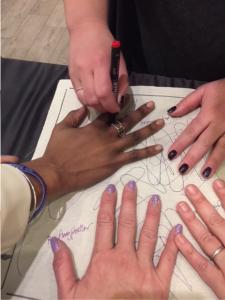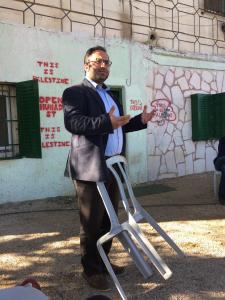It’s the first thing you learn in basic pastoral care class. The role of a pastor in a crisis situation is to be a non-anxious presence. That means that the pastor is supposed to be calm and reassuring under all conditions, even when everyone else is freaking out.
The irony of this critical vocational skill is that there really is no learning a non-anxious presence. No class, practicum, study guide or tutorial . . . only really hard situations in which you are required to show up and, if you can muster it, pray. You learn on the job, oftentimes feeling utterly and totally anxious, trying to communicate a non-anxious presence while in the throes of what feels like an anxiety attack.
Yesterday I spent most of the day at the hospital. A young family worked to support each other as their baby was born dead. It was pain on all levels—a young father crushed but trying to  support his wife; a sleepy three-year-old not understanding much except “Mommy’s sick” and a heartsick mother unable to ease the pain of labor and a broken heart.
support his wife; a sleepy three-year-old not understanding much except “Mommy’s sick” and a heartsick mother unable to ease the pain of labor and a broken heart.
I was there, trying diligently to provide a non-anxious presence as I was told to do in that pastoral care class all those years ago, all the while feeling almost tangibly the heartbreak of the situation. There were no magic words I could call to mind. There was only Kleenex and ice chips, back rubs and prayers, all offered with what felt to me like a lot of anxiety despite my determination to practice what I learned in seminary.
In this situation like many others in the work of the preacher, I found myself at a curious intersection of human life, the crossing of utter pain and redeeming grace. There was nothing right about it, nothing at all. Nothing just, comforting, helpful or relieved. No, there was none of that, but there was great love, the presence of God, the painful but reassuring knowledge that life goes on even with the grief. It’s a poignantly beautiful, painful place.
And I found it hard not to feel anxious.
Yesterday I finally felt my anxious pastoral presence easing when I got to hold that just-born baby. He was a precious little guy, perfectly formed; wrapped in a blanket, warm and solid in my arms. After hours of anxious anticipation I felt at that moment nothing anxious at all . . . just the calm assurance that this baby is surely loved by his parents and by God. Strangely enough, as we cried and prayed and said goodbye it seemed to me that all of us around that hospital bed had stumbled unexpectedly upon few holy moments, an oasis of grace, a true, almost tangible, enveloping non-anxious presence.
And, sorry Dr. Blevins, but I’m fairly certain it was not mine.
After this week of poignant opportunities to try to be a non-anxious presence in situations that make me hyperventilate when I just think about them, I’m starting to suspect that this non-anxious presence we learned about in seminary is not the pastor’s presence at all.
What our task as pastors must be, I got to thinking, is not necessarily to BE the non-anxious presence but rather to WELCOME that non-anxious presence precisely because when we step into situations like that we are so anxious. Most days the best we bring is the expectation of God’s pastoral, non-anxious presence–not our own.
The writer of Lamentations must have known what it felt like to welcome God’s Spirit into a heart-wrenching, utterly anxiety-provoking experience because that writer describes God’s non-anxious presence so vividly:
But this I call to mind, and therefore I have hope: The steadfast love of the Lord never ceases, God’s mercies never come to an end; they are new every morning; great is your faithfulness. ‘The Lord is my portion,’ says my soul, ‘therefore I will hope in God.’
Lamentations 3:21-24
For the holy honor of walking through the pain with parents who are grieving . . . I feel uncommonly grateful today. And that’s about the sum of it, because my tearful and, yes, anxious presence at the hospital last night certainly did not meet the standard we learned that first day in pastoral care class.
But I wonder: could it be that my professor was mistaken? Maybe my job is to show up, anxious or not, and just to point to the horizon in expectation. Yes . . . I think my job might be to pass out Kleenex and ice chips, back rubs and prayers, and just hold hands while we all wait for that non-anxious presence, God’s tender mercies like a soothing balm to an utterly anxious situation.











